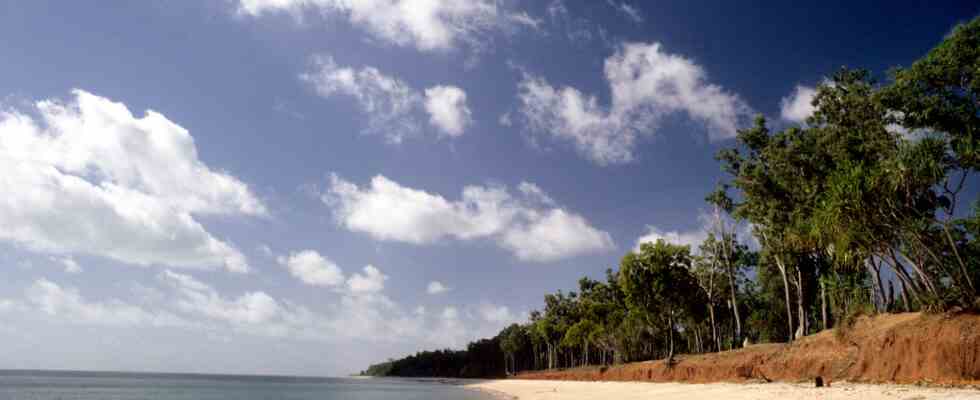Status: 11.10.2022 2:25 p.m
There are oil and gas fields off the Australian Tiwi Islands that the Santos group wants to develop. On the other hand, residents who see their nature endangered complained. With success: The group has to stop drilling – for the time being.
Dennis Tipakalippa dances on the beach. He and the indigenous people of the Tiwi Islands have won – at least for now. Australia’s federal court recently ruled that Santos’ drilling permit was invalid. “I’m the happiest man in the world,” says Tipakalippa.
Hundreds of animal and plant species live on the Tiwi Islands that are found nowhere else in the world – and a drilling platform, many ships and thus a possible oil slick would endanger all of this, says indigenous Therese Burke at the local environmental center. The water that surrounds the islands is very important for the residents: “Firstly, because it gives us food. And secondly, because it connects us to our ancestors.” Rare turtles lay their eggs on the islands. Whales, crocodiles and rare manatees swim in the water off the islands. The indigenous people see this diversity of species threatened by the drilling.
Population not informed enough
In a first judgment, the Australian federal court has now ruled in favor of the island residents. The oil and gas company did not sufficiently inform the indigenous population about the project, explains lawyer Alina Leikin, who helped negotiate the case. The judgment has a signal effect for the whole world. “It raises the standards that drilling companies have to meet,” says Leikin, adding: The verdict also shows that corporations can no longer ignore the indigenous people.
For far too long, tribal peoples around the world have been excluded from very important conversations about the lands and waters they own and have protected for thousands of years.
Around 30 people involved in the trial went to the Tiwi Islands during the trial. That was a very important moment for the residents, says Leikin: they could have shown the court their dances, songs and untouched nature. Traditions that they want to protect and pass on to future generations. “We want to be able to continue fishing and not have to live on fast food for the next few decades,” says Tipakalippa.
drilling set
The Barossa gas field off the Tiwi Islands is considered the most emissions-intensive in Australia, according to activists. Extracting the gas would release an enormous amount of CO2. A fatal sign at a time when the world should be trying to slow climate change, says native Pirrawayingi. He has felt the weather change for many years: “It should be cooler in the dry season, but we notice that the temperature is changing, it’s warmer.”
The oil and gas company Santos must now stop drilling and to tow the drilling platform back to Darwin Harbour. For the group, it’s about billions, the project was already half done. The first test drillings were carried out in the summer.
In a statement following the ruling, Santos wrote: “Barossa is an important gas project for the nation, creating jobs, exports and strengthening our relationships with investors and gas consumers in Asia who have depended on Australia’s secure energy for decades.”
Santos did not sufficiently inform Tiwi residents about his plans, the court ruled. The group has already appealed.
Image: REUTERS
Appeal process follows
The group also says that it has submitted an environmental plan and consulted local bodies and therefore does not understand that the regulator’s approval has been annulled. The press statement therefore goes on to say: “The uncertainty surrounding project approval is an issue that the Australian Government should urgently address in order to reduce risk to trade and investment in projects across the country.”
Santos has appealed the verdict. The court hearing will take place from November 15. The residents of the Tiwi Islands hope that they too will win this process – for their country and for the environment.

